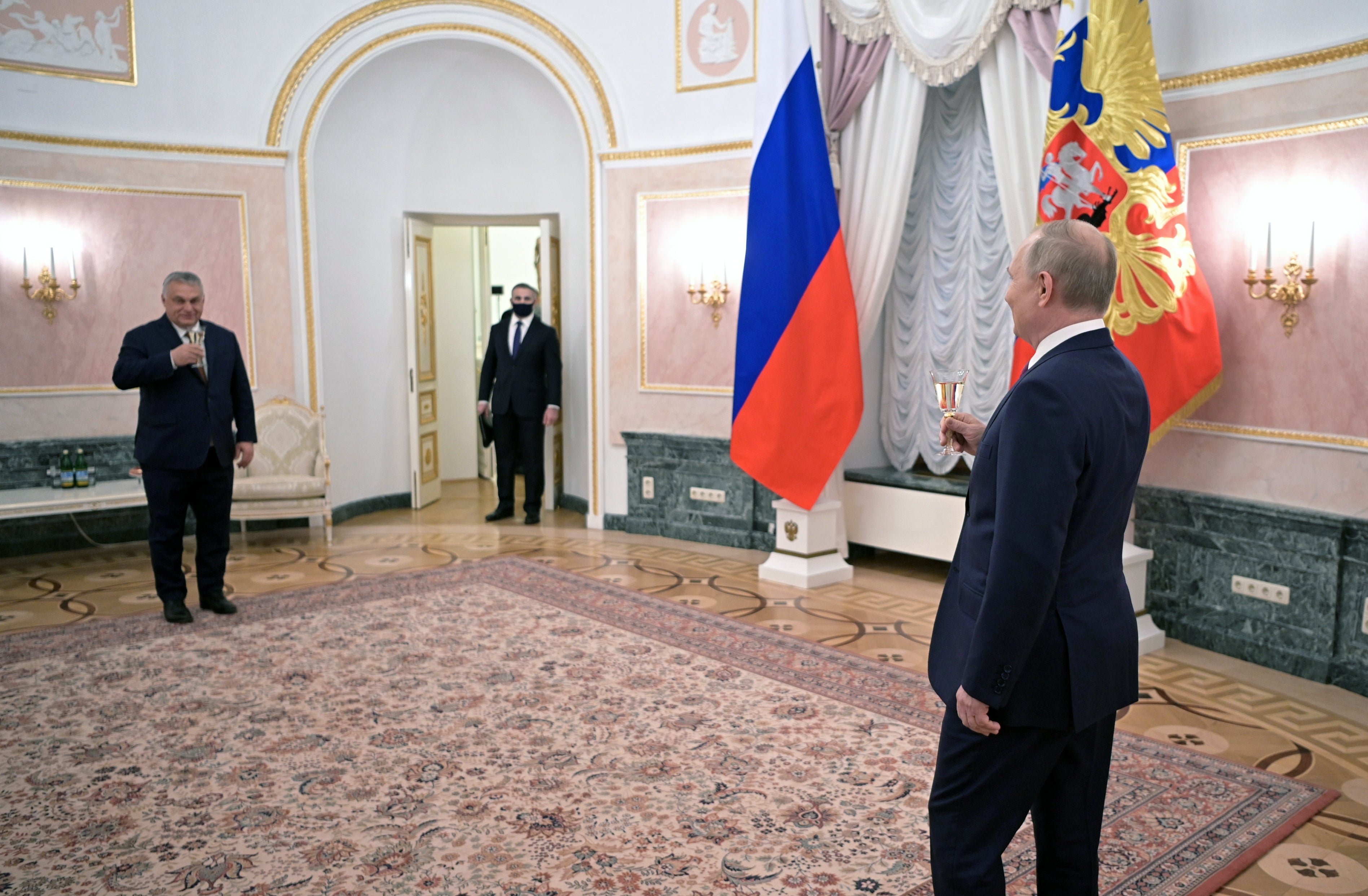Ukraine’s fears over close ties between Russia and Hungary stretch beyond Putin and Orban
Fears of war – and a cosy relationship between Moscow and Budapest – have moved the spotlight onto a western region of Ukraine that has a large Hungarian population, reports Kim Sengupta in Kiev


Vladimir Putin has accused the US and Nato of using Ukraine to harm Russia’s interests in the latest round of acrimonious exchanges, as faltering diplomatic steps continue to try to avert a war in Europe.
Sitting beside the Russian president as he delivered his denunciation of the west in Moscow was Viktor Orban, whose closeness to the Kremlin has caused deep concern among fellow members of Nato and the European Union.
The prime minister of Hungary, gesturing towards Mr Putin, said with a smile: “This is our 13th meeting and that is a rarity. Practically all those who were my colleagues in the EU are no longer. I have high hopes that for many years to come we can work together.”
But it is not just Budapest’s cosiness with Moscow that is a worry for the west in the present combustible climate. Hungary’s interaction with Ukraine has been long, and often controversial, with accusations and recriminations flying between the two countries.
Hungary’s foreign minister, Peter Szijjarto, declared recently that no one should tell his country to re-evaluate its relationship with Moscow.
He went on to accuse Ukraine of depriving ethnic Hungarians in the country “of their rights” and of being “deliberately provocative”. The actions taken by the Kiev government, he stated, made it very difficult to back it “even in this conflict” with Russia.
Ukraine, in turn, has claimed that Mr Orban’s government is whipping up separatist sentiment among the 170,000 or so people of Hungarian descent in the Zakarpattia region. A number of Budapest government officials have been banned from entering the country for allegedly trying to interfere in domestic politics.
The issues have had an important impact on Ukraine’s attempts to join Nato. For three years, Hungary has blocked ministerial-level political meetings between Nato and Ukraine, because, it says, of the violation of the human rights of its ethnic minorities by the Ukrainian government.
One of the main complaints is about the state language law enacted by the parliament in Kiev, which made Ukrainian the compulsory official language in all public spheres. This, say critics, effectively means that minority languages, with a few exceptions, can only be spoken privately or in religious ceremonies.
Zakarpattia, a region in the west of the country that is also known as Transcarpathia, also has a population of Russian extraction: the Rusines.
Hungary’s parliament, the National Assembly, has in the past proposed to its Russian counterpart, the Duma, that the two countries work together to “protect’’ minority communities in Ukraine.
Vyacheslav Volodin, the Duma speaker, followed up by blaming the “sad plight” of ethnic communities on Ukrainian nationalism, warning that “oppression of small ethnic groups may lead to Ukraine losing a number of regions”.
A number of pro-Russian public figures in Ukraine are from Zakarpattia. They include Viktor Medvedchuk, a pro-Russian oligarch and MP, who says that President Putin is the godfather to his daughter.
Mr Medvechuk was accused of treason and placed under house arrest by the authorities in Kiev. Mr Putin subsequently devoted a huge amount of his opening speech at a meeting of the Russian Security Council to developments in Ukraine, accusing the Ukrainian government under its president Volodymyr Zelensky of “purging their political environment” and suggesting that Ukraine was turning “slowly but steadily into an antipode of Russia, an anti-Russia”.
Hungarian organisations in Zakarpattia have received a substantial amount of funding from Budapest, as have Magyar communities in other countries in the region, such as Romania, Slovakia and Serbia.
The total sum sent to the diaspora over the last decade by the government-controlled Bethlen Gabor fund, according to some Ukrainian analysts, amounts to around €1.1bn (£925m).
The Hungarian government insists that the grants are used to support cultural and religious organisations, schools and colleges, media outlets and sporting facilities.
Ukrainian officials, however, claim that some of the money sent to Zakarpattia has ended up in the hands of Hungarian political organisations.
During regional elections in 2019, a number of Hungarian officials, including Mr Szijjarto, were present at campaign events for candidates favoured by Budapest. One of the candidates, Vasyl Brenzovych, met Mr Orban and the deputy prime minister in charge of national policy, Zsolt Semjen, in Budapest.
The Ukrainian government protested that these activities were against the UN charter of interference by a foreign power and the Vienna Convention on Diplomatic Relations. Budapest maintained that meeting co-ethnic communities abroad was normal practice throughout the world.
Some from the Hungarian community in Zakarpattia hold that the Ukrainian government is making them feel like outsiders. Fredek Szakacs, a 38-year-old shop owner in the city of Uzhhorod, said: “Our family has been living here for three generations. We are proud of our Hungarian background but we are also part of Ukraine.
“The language laws have caused a lot of problems here. A lot of people feel that the government is trying to make us lose our identity as a community. We do not think this is right.”
Hanna Matyas, a teacher aged 29, commented: “These changes are particularly hard for older people; they find it very upsetting.
“It is true that some Hungarian organisations send money here. That is useful to keep cultural associations going and also for poorer people who simply cannot earn enough. Maybe there are some political figures trying to exploit divisions, but most people want to just get on with their lives without trouble.”
Join our commenting forum
Join thought-provoking conversations, follow other Independent readers and see their replies
Comments


Bookmark popover
Removed from bookmarks